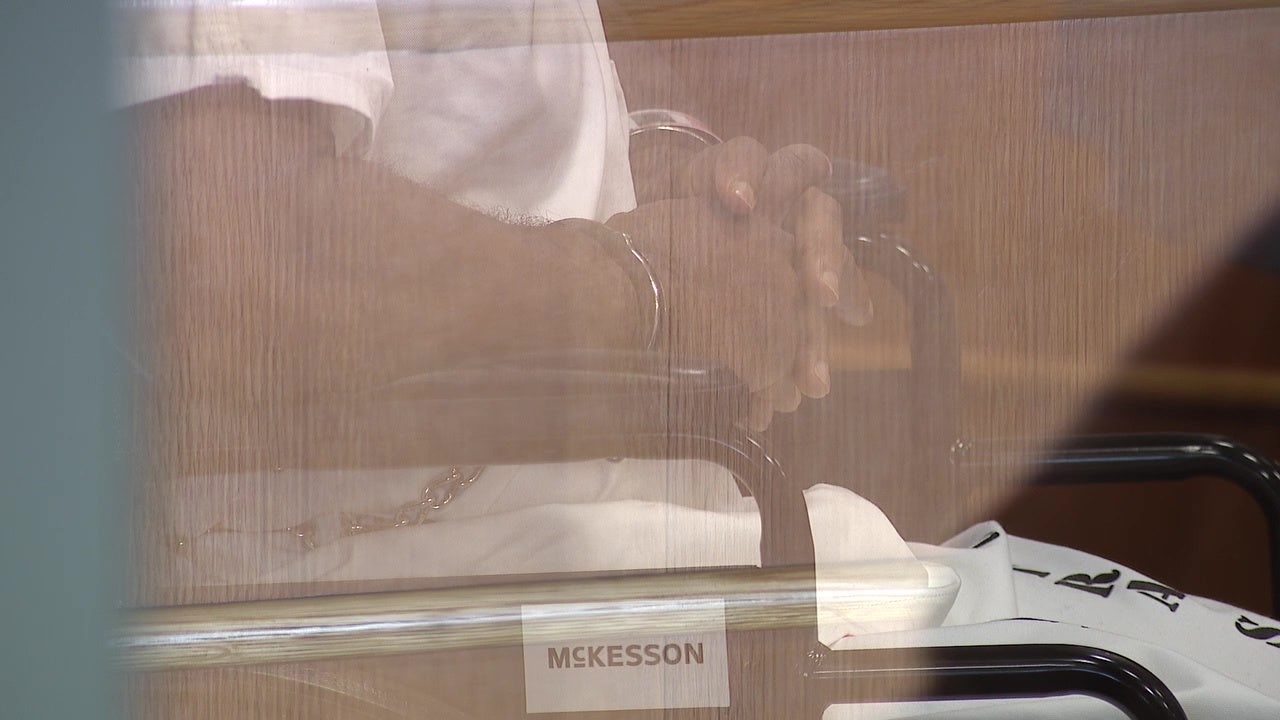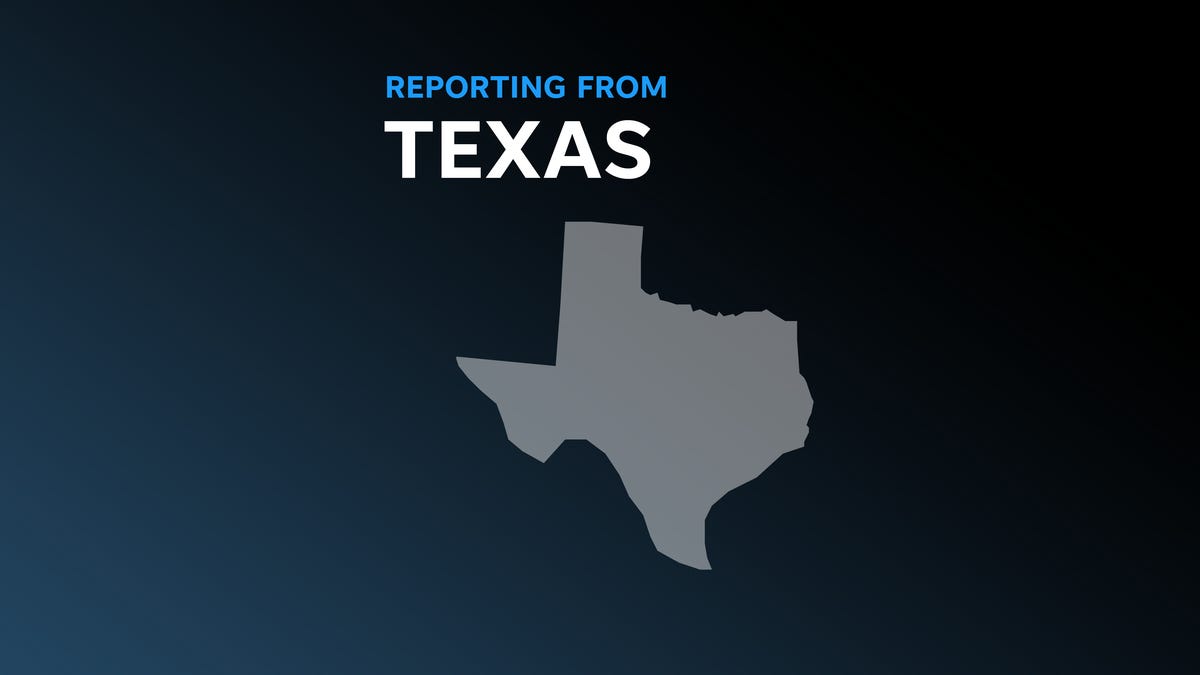World
He is Ecuador’s youngest president-elect. What lies ahead for Daniel Noboa?

Quito, Ecuador – Night had already fallen, and all the shops were closed on the Avenue of the Shyris, a main thoroughfare in the heart of Quito, Ecuador.
But part of the street was nevertheless packed last Sunday, as supporters of Daniel Noboa converged on the bleachers outside La Carolina Park to celebrate his victory over leftist Luisa Gonzalez in the 2023 presidential race.
“This is a triumph for the youngest,” Maria Paz, 25, told Al Jazeera as she joined the revellers on the avenue.
At age 35, Noboa is set to become Ecuador’s youngest elected president, and during his campaign, he appealed to the country’s relatively young electorate. Nearly a fourth of all eligible voters are between ages 18 and 29.
But Noboa faces an uphill battle as he prepares to take over the Palacio de Carondelet, Ecuador’s presidential palace.
Faced with an abbreviated 18-month term in office, Noboa has little time — and little political backing — with which to address some of Ecuador’s most pressing problems.
And the stakes are high. Ecuador’s economy is still recovering from the COVID-19 pandemic, and crime has shot upwards, threading the population with fear.
But voters like Paz are optimistic. When she heard the election-night results, she rushed to the avenue with a life-sized cardboard cutout of the president-elect in tow. “Now I expect jobs to come and organised crime to leave my country,” she said.
So many issues, so little time
The circumstances of Noboa’s election are historic. In May, confronted with possible impeachment, current President Guillermo Lasso invoked a never-before-used constitutional mechanism known as “muerte cruzada” or “two-way death”.
That allowed him to dissolve the National Assembly — at the expense of ending his own presidency. Lasso had 90 days to call a new election.
The “two-way death” also limited how long Lasso’s successor could serve in office. Normally, a full presidential term is four years. But under “two-way death”, Lasso’s successor can only serve out the remainder of his term: 18 months.
That means Ecuadorians will once again go to the ballot box in May 2025, barely a year and a half after Noboa is sworn in.
The brevity of that mandate puts pressure on Noboa to act — and act fast.

“He must deal with the insecurity. To some extent, he should promote public health, support the most impoverished sectors, and grant opportunities for higher education,” Santiago Basabe, the director of the Ecuadorian Association of Political Science, told Al Jazeera.
“Other than that, I don’t think he can do much more in this given time.”
Governing with a fragmented assembly
According to Basabe, Noboa is the first head of state since 1979 to come to power without the endorsement of a formal political party.
The heir to one of Ecuador’s wealthiest families, which made its fortune in banana exports, Noboa is a relative newcomer to national politics. He was first elected to the National Assembly in 2021, and he was in the midst of his inaugural term when the legislature was dissolved.
As a freshman assembly member, Noboa had not yet risen in the ranks of an existing political party nor formed a robust political movement.
So he relied on the backing of two existing parties to support his bid for the presidency: a group called People, Equality and Democracy (PID), plus the Revolutionary and Democratic Ethical Green Movement (MOVER).
Together with Noboa’s own movement, they formed a coalition called the National Democratic Alliance (ADN). But each party still maintains its independence. Neither PID nor MOVER is formally led by Noboa.
In addition, Noboa must also deal with a fragmented National Assembly. Since new legislative elections were held in August, no single political group holds an overall majority.
Of the 137 seats in the assembly, Noboa’s ADN coalition secured approximately 14 seats, compared with about 52 for the Citizen Revolution Movement, the party of Gonzalez, his presidential rival.
Neither total is enough to lead the assembly without additional votes from outside parties.
“Pragmatism must be his northern star,” Basabe said. He believes that Noboa should avoid engaging with the National Assembly as much as possible, focusing instead on what he can do through executive action.
“Buying new gear for the security forces doesn’t need authorisation from the National Assembly. He only needs to devote some budget to it and have the political will to push it forward,” Basabe explained.

Fears of a ‘Lasso 2.0’
Noboa also faces suspicion that he is part of a political trend rightward that began with Lasso.
The outgoing president was the country’s first elected conservative leader in nearly two decades. Like Noboa, Lasso was a businessman before his career in politics, having led a prominent bank.
In the lead-up to Sunday’s run-off race, Gonzalez and the Citizen Revolution Movement sought to link the two men, framing Noboa as a continuation of the rightward lurch Lasso began.
Critics pointed to his running mate Verónica Abad as evidence of that political leaning. A right-wing business coach, Abad has spoken about her desire to privatise Ecuador’s education and health services, and she has been vocal in her criticism of abortion and feminism.
But Noboa has described his views as centre-left, and analysts stress it is too soon to understand how he might govern, given his limited political history.
“He’s a 35-year-old kid with no real political experience, who answers to an enormous fortune. No one has a clue about what his government will be,” Basabe said.
Political analyst Arianna Tanca Macchiavello told Al Jazeera she believes fiscal and political constraints will define Noboa’s administration more than any ideology.
She explained his political campaign thus far has relied on optics, with Noboa presenting himself as neither right-wing nor left-wing.
“Noboa might need to leap from political marketing to governing,” Tanca said.
Both Basabe and Tanca indicated that Noboa’s choice of cabinet members would be an opportunity for the president-elect to establish his administration as distinct from Lasso’s. But Basabe warned that, if Noboa enlists only wealthy advisers and establishment figures, he would risk outraging the public.
“His cabinet should smell of diversity and taste like renovation,” Basabe said.

Facing Ecuador’s security dilemma
In the days since the election, Noboa has already taken actions to start to organise his administration and set priorities.
Much of his early moves have to do with Ecuador’s volatile security situation. Once a relatively peaceful country, Ecuador has seen its murder rate skyrocket in recent years.
In the first six months of 2023, Ecuadorian police documented 4,374 homicides, putting the country on track to be the third-most violent in Latin America.
Part of the problem stems from the increasing presence of organised crime, seeking to take advantage of drug-trafficking routes through Ecuador. The country sits between major cocaine-producing regions in Colombia and Peru and borders the Pacific Ocean.
The government has struggled to contain the resulting violence. On Tuesday, Noboa met with Lasso and asked him to summon a security council as soon as possible.
During the last presidential debate, Noboa also said he would hold a nationwide referendum over the role of Ecuador’s armed forces during his first 100 days in office.

According to Luis Córdova-Alarcón, an expert in conflict and violence at the Central University of Ecuador, Lasso used a military approach to combat organised crime, with support from the US and Israel.
“But there was no political strategy to accompany it,” Córdova told Al Jazeera.
Córdova believes this militarised “war on drugs” approach leads only to more violence. He instead thinks that Noboa should set his sights on investigating money laundering, rooting out official corruption and reforming the police.
But that could be a hefty challenge for 18 months in office, Córdova said. Noboa will have his hands full during that time.
“Lowering the criminal violence, reducing corruption and achieving economic growth are all priorities for Latin America. But you can only achieve one or two of them, not all at once,” Córdova said.
As she cast her vote last Sunday, political scientist Pamela Ledesma told Al Jazeera that 18 months as president may not be enough time to enact substantial change — but it is plenty of time to lose public favour.
“I believe that the victory will veer into a punishment for whoever wins,” she said.

World
Saudi executions rose sharply in 2024

World
Israel launches strikes in Yemen on Houthi military targets, IDF says
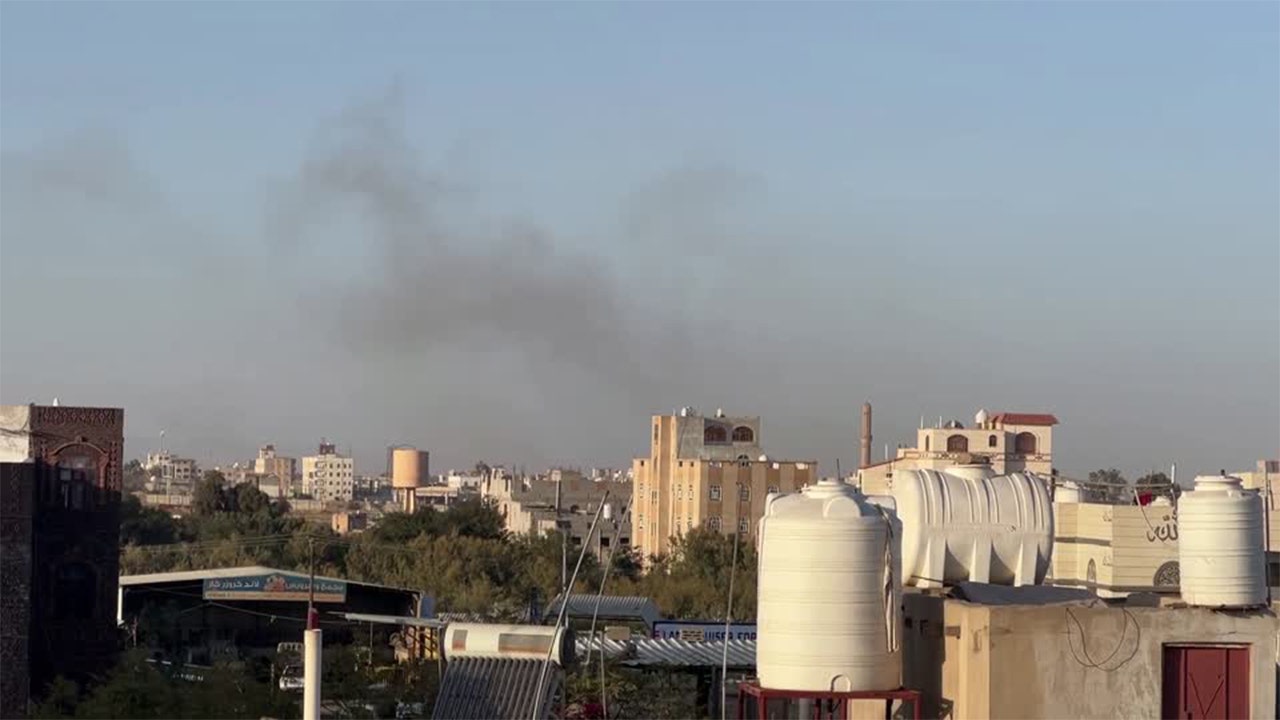
The Israeli military claimed responsibility for a series of airstrikes in Yemen on Thursday that hit Sana’a International Airport and other targets in the Houthi-controlled capital.
The Israel Defense Forces said the strikes targeted military infrastructure used by the Houthis to conduct acts of terrorism.
“The Houthi terrorist regime has repeatedly attacked the State of Israel and its citizens, including in UAV and surface-to-surface missile attacks on Israeli territory,” the IDF said in a statement.
“The targets that were struck by the IDF include military infrastructure used by the Houthi terrorist regime for its military activities in both the Sana’a International Airport and the Hezyaz and Ras Kanatib power stations. In addition, the IDF struck military infrastructure in the Al-Hudaydah, Salif, and Ras Kanatib ports on the western coast.”
PROJECTILE FROM YEMEN STRIKES NEAR TEL AVIV, INJURING MORE THAN A DOZEN: OFFICIALS
Black smoke rises near Sana’a International Airport in Yemen after reported Israeli airstrikes. (Reuters)
The strikes come days after Israel’s defense minister promised retaliation against Houthi leaders for missile strikes launched at Israel from Yemen.
Houthi rebels, who control most of northern Yemen, have fired upon Israel for more than a year to support Hamas terrorists at war with the Jewish State. The Houthis have attempted to enforce an embargo on Israel by launching missiles and drones at cargo vessels crossing the Red Sea – a major shipping lane for international trade.
US NAVY SHIPS REPEL ATTACK FROM HOUTHIS IN GULF OF ADEN
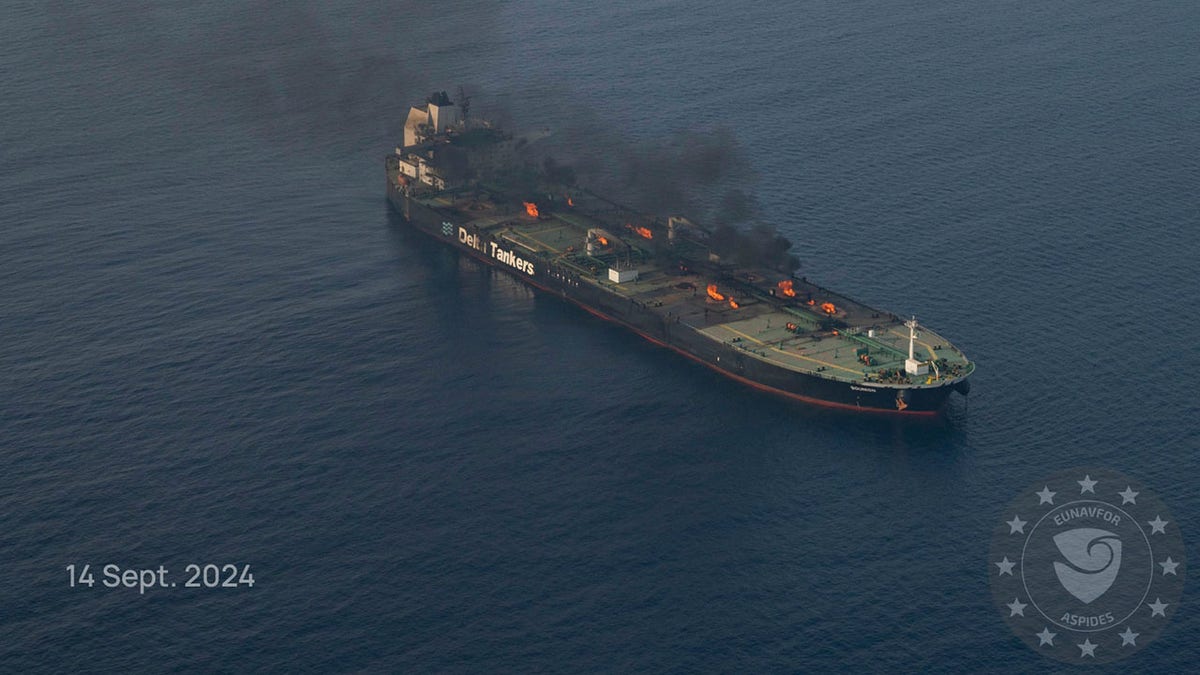
This photo released by the European Union’s Operation Aspides naval force shows the oil tanker Sounion burning in the Red Sea following a series of attacks by Yemen’s Houthi rebels, on Saturday Sept. 14, 2024. (European Union’s Operation Aspides via AP)
Overall, the Houthis have launched over 200 missiles and 170 drones at Israel since Hamas’s Oct. 7, 2023, massacre of 1,200 people. Since then, the Houthis have also attacked more than six dozen commercial vessels – particularly in the Bab-el-Mandeb, the southern maritime gateway to Egypt’s Suez Canal.
On Saturday, a projectile launched into Israel from Yemen struck Tel Aviv and caused mild injuries to 16 people, Israeli officials said. The incident was a rare occasion where Israeli defense systems failed to intercept an attack.
NETANYAHU WARNS HOUTHIS AMID CALLS FOR ISREAL TO WIPE OUT TERROR LEADERSHIP AS IT DID WITH NASRALLAH, SINWAR
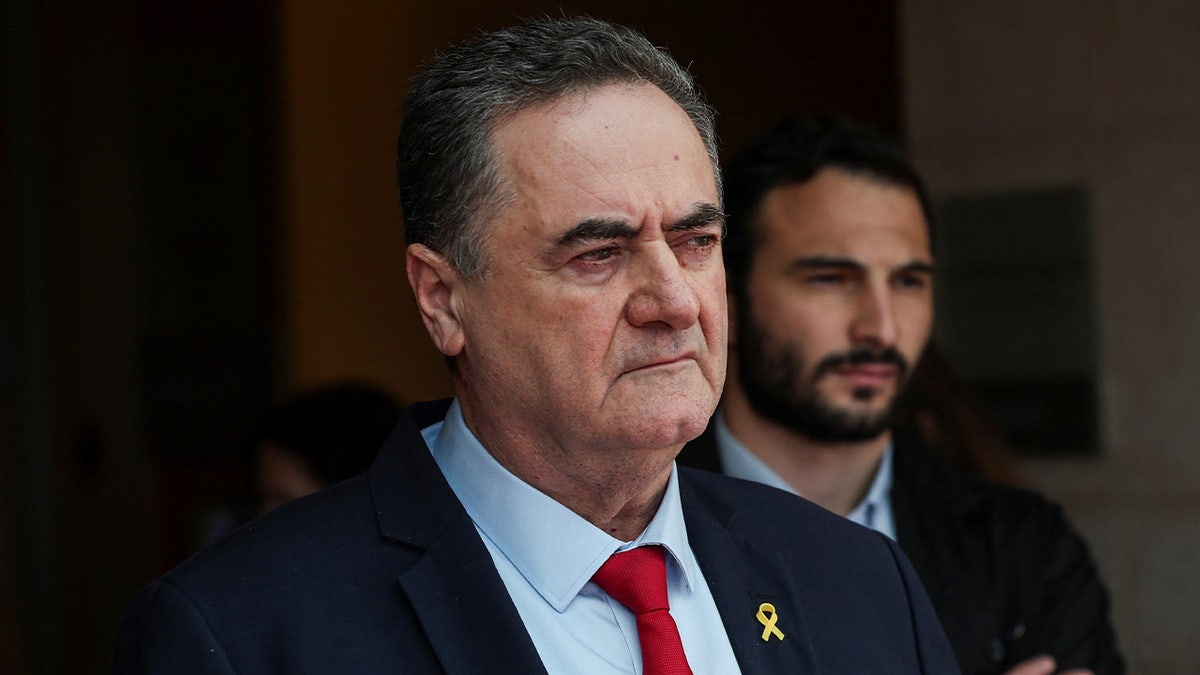
Israeli Defense Minister Israel Katz looks on, amid the ongoing conflict in Gaza between Israel and Hamas, in Jerusalem, November 7, 2024. (REUTERS/Ronen Zvulun)
Israel retaliated by striking multiple targets in areas of Yemen under Houthi control, including power plants in Sana’a.
Israeli leaders have vowed to eliminate Houthi leadership if the missile and drone attacks do not cease.
On Monday, Israeli Defense Minister Israel Katz said, “We will strike their strategic infrastructure and decapitate their leaders. Just as we did to [former Hamas chief Ismail] Haniyeh, Sinwar and Nasrallah, in Tehran, Gaza and Lebanon – we will do in Hodeidah and Sanaa.”
Prime Minister Benjamin Netanyahu has also urged Israelis to be “patient” and suggested that soon the military will ramp up its campaign against the Houthis.
“We will take forceful, determined and sophisticated action. Even if it takes time, the result will be the same,” he said. “Just as we have acted forcefully against the terror arms of Iran’s axis of evil, so too will we act against the Houthis.”
Fox News Digital’s Amelie Botbol contributed to this report.
World
Retraction of US-backed Gaza famine report draws anger, scrutiny

United States President Joe Biden’s administration is facing criticism after a US-backed report on famine in the Gaza Strip was retracted this week, drawing accusations of political interference and pro-Israel bias.
The report by the Famine Early Warning Systems Network (FEWS NET), which provides information about global food insecurity, had warned that a “famine scenario” was unfolding in northern Gaza during Israel’s war on the territory.
A note on the FEWS NET website, viewed by Al Jazeera on Thursday, said the group’s “December 23 Alert is under further review and is expected to be re-released with updated data and analysis in January”.
The Associated Press news agency, quoting unnamed American officials, said the US asked for the report to be retracted. FEWS NET is funded by the US Agency for International Development (USAID).
USAID did not immediately respond to Al Jazeera’s request for comment on Thursday afternoon.
Israel’s war in Gaza has killed more than 45,300 Palestinians since early October 2023 and plunged the coastal enclave into a dire humanitarian crisis as access to food, water, medicine and other supplies is severely curtailed.
An Israeli military offensive in the northern part of the territory has drawn particular concern in recent months with experts warning in November of a “strong likelihood” that famine was imminent in the area.
“Starvation, malnutrition, and excess mortality due to malnutrition and disease, are rapidly increasing” in northern Gaza, the Integrated Food Security Phase Classification said in an alert on November 8.
“Famine thresholds may have already been crossed or else will be in the near future,” it said.
The report
The FEWS NET report dated December 23 noted that Israel has maintained a “near-total blockade of humanitarian and commercial food supplies to besieged areas” of northern Gaza for nearly 80 days.
That includes the Jabalia, Beit Lahiya and Beit Hanoon areas, where rights groups have estimated thousands of Palestinians are trapped.
“Based on the collapse of the food system and worsening access to water, sanitation, and health services in these areas … it is highly likely that the food consumption and acute malnutrition thresholds for Famine (IPC Phase 5) have now been surpassed in North Gaza Governorate,” the FEWS NET report had said.
The network added that without a change to Israeli policy on food supplies entering the area, it expected that two to 15 people would die per day from January to March at least, which would surpass the “famine threshold”.
The report had spurred public criticism from the US ambassador to Israel, Jack Lew, who in a statement on Tuesday said FEWS NET had relied on “outdated and inaccurate” data.
Lew disputed the number of civilians believed to be living in northern Gaza, saying the civilian population was “in the range of 7,000-15,000, not 65,000-75,000 which is the basis of this report”.
“At a time when inaccurate information is causing confusion and accusations, it is irresponsible to issue a report like this,” he said.
— Ambassador Jack Lew (@USAmbIsrael) December 24, 2024
‘Bullying’
But Palestinian rights advocates condemned the ambassador’s remarks. Some accused Lew of appearing to welcome the forced displacement of Palestinians in Gaza.
“To reject a report on starvation in northern Gaza by appearing to boast about the fact that it has been successfully ethnically cleansed of its native population is just the latest example of Biden administration officials supporting, enabling and excusing Israel’s clear and open campaign of genocide in Gaza,” the Council on American-Islamic Relations said in a statement.
The group urged FEWS NET “not to submit to the bullying of genocide supporters”.
Huwaida Arraf, a prominent Palestinian American human rights lawyer, also criticised Lew for “relying on Israeli sources instead of your own experts”.
“Do you work for Israel or the American people, the overwhelming majority of whom disapprove of US support for this genocide?” she wrote on X.
Polls over the past year have shown a high percentage of Americans are opposed to Israel’s offensive in Gaza and want an end to the war.
A March survey by Gallup found that 55 percent of people in the US disapproved of Israel’s actions in Gaza while a more recent poll by the Pew Research Center, released in October, suggested about three in 10 Americans believed Israel’s military offensive is “going too far”.
While the Biden administration has said it is pushing for a ceasefire in Gaza, it has rebuffed calls to condition US assistance to Israel as a way to bring the war to an end.
Washington gives its ally at least $3.8bn in military assistance annually, and researchers at Brown University recently estimated that the Biden administration provided an additional $17.9bn to Israel since the start of the Gaza war.
The US is required under its own laws to suspend military assistance to a country if that country restricts the delivery of American-backed humanitarian aid, but Biden’s administration has so far refused to apply that rule to Israel.
“We, at this time, have not made an assessment that the Israelis are in violation of US law,” Department of State spokesperson Vedant Patel told reporters in November despite the reports of “imminent” famine in northern Gaza.
-
/cdn.vox-cdn.com/uploads/chorus_asset/file/24924653/236780_Google_AntiTrust_Trial_Custom_Art_CVirginia__0003_1.png)
/cdn.vox-cdn.com/uploads/chorus_asset/file/24924653/236780_Google_AntiTrust_Trial_Custom_Art_CVirginia__0003_1.png) Technology6 days ago
Technology6 days agoGoogle’s counteroffer to the government trying to break it up is unbundling Android apps
-

 News7 days ago
News7 days agoNovo Nordisk shares tumble as weight-loss drug trial data disappoints
-

 Politics7 days ago
Politics7 days agoIllegal immigrant sexually abused child in the U.S. after being removed from the country five times
-

 Entertainment1 week ago
Entertainment1 week ago'It's a little holiday gift': Inside the Weeknd's free Santa Monica show for his biggest fans
-

 Lifestyle7 days ago
Lifestyle7 days agoThink you can't dance? Get up and try these tips in our comic. We dare you!
-
/cdn.vox-cdn.com/uploads/chorus_asset/file/25672934/Metaphor_Key_Art_Horizontal.png)
/cdn.vox-cdn.com/uploads/chorus_asset/file/25672934/Metaphor_Key_Art_Horizontal.png) Technology2 days ago
Technology2 days agoThere’s a reason Metaphor: ReFantanzio’s battle music sounds as cool as it does
-

 Technology1 week ago
Technology1 week agoFox News AI Newsletter: OpenAI responds to Elon Musk's lawsuit
-

 News3 days ago
News3 days agoFrance’s new premier selects Eric Lombard as finance minister
